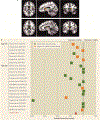Reward Processing in Depression: A Conceptual and Meta-Analytic Review Across fMRI and EEG Studies
- PMID: 29921146
- PMCID: PMC6345602
- DOI: 10.1176/appi.ajp.2018.17101124
Reward Processing in Depression: A Conceptual and Meta-Analytic Review Across fMRI and EEG Studies
Abstract
Objective: A role for aberrant reward processing in the pathogenesis of depression has long been proposed. However, no review has yet examined its role in depression by integrating conceptual and quantitative findings across functional MRI (fMRI) and EEG methodologies. The authors quantified these effects, with an emphasis on development.
Method: A total of 38 fMRI and 12 EEG studies were entered into fMRI and EEG meta-analyses. fMRI studies primarily examined reward anticipation and reward feedback. These were analyzed using the activation likelihood estimation method. EEG studies involved mainly the feedback-related negativity (FRN) event-related potential, and these studies were analyzed using random-effects meta-analysis of the association between FRN and depression.
Results: Analysis of fMRI studies revealed significantly reduced striatal activation in depressed compared with healthy individuals during reward feedback. When region-of-interest analyses were included, reduced activation was also observed in reward anticipation, an effect that was stronger in individuals under age 18. FRN was also significantly reduced in depression, with pronounced effects in individuals under age 18. In longitudinal studies, reduced striatal activation in fMRI and blunted FRN in EEG were found to precede the onset of depression in adolescents.
Conclusions: Taken together, the findings show consistent neural aberrations during reward processing in depression, namely, reduced striatal signal during feedback and blunted FRN. These aberrations may underlie the pathogenesis of depression and have important implications for development of new treatments.
Keywords: Depression; EEG; Meta-analysis; Reward; fMRI.
Conflict of interest statement
The authors report no financial relationships with commercial interests.
Figures


References
-
- World Health Organization: Depression: A Global Crisis. Geneva, World Health Organization, 2012
-
- Insel T, Cuthbert B, Garvey M, et al. : Research Domain Criteria (RDoC): toward a new classification framework for research on mental disorders. Am J Psychiatry 2010; 167:748–751 - PubMed
Publication types
MeSH terms
Grants and funding
LinkOut - more resources
Full Text Sources
Other Literature Sources
Medical

